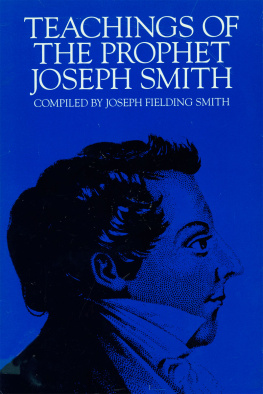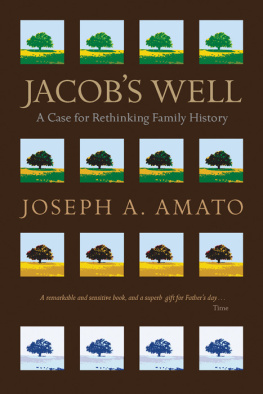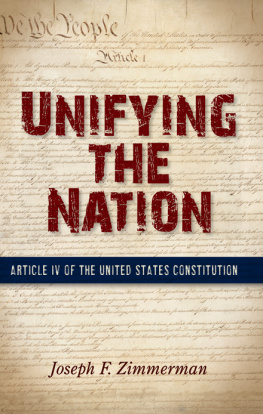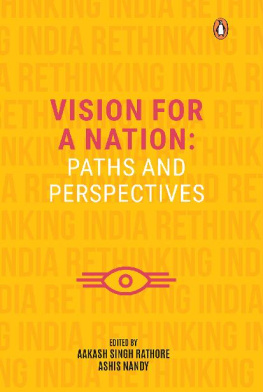
Paths toward the Nation
Ohio University Research in International Studies
This series of publications on Africa, Latin America, Southeast Asia, and Global and Comparative Studies is designed to present significant research, translation, and opinion to area specialists and to a wide community of persons interested in world affairs. The editors seek manuscripts of quality on any subject and can usually make a decision regarding publication within three months of receipt of the original work. Production methods generally permit a work to appear within one year of acceptance. The editors work closely with authors to produce high-quality books. The series appears in a paperback format and is distributed worldwide. For more information, consult the Ohio University Press website, ohioswallow.com.
Books in the Ohio University Research in International Studies series are published by Ohio University Press in association with the Center for International Studies. The views expressed in individual volumes are those of the authors and should not be considered to represent the policies or beliefs of the Center for International Studies, Ohio University Press, or Ohio University.
Paths toward the Nation
ISLAM, COMMUNITY, AND EARLY
NATIONALIST MOBILIZATION IN
ERITREA, 19411961
Joseph L. Venosa
Ohio University Research in International Studies
Africa Series No. 92
Ohio University Press
Athens
2014 by the
Center for International Studies
Ohio University
All rights reserved
To obtain permission to quote, reprint, or otherwise reproduce or distribute material from Ohio University Press publications, please contact our rights and permissions department at (740) 593-1154 or (740) 593-4536 (fax).
www.ohioswallow.com
Printed in the United States of America
The books in the Ohio University Research in International Studies Series are printed on acid-free paper

24 23 22 21 20 19 18 17 16 15 14 5 4 3 2 1
All photographs reproduced with permission from the Bodleian Library of Commonwealth and African Studies at Rhodes House, Oxford University.
Library of Congress Cataloging-in-Publication Data
Venosa, Joseph L., author.
Paths toward the nation : Islam, community, and early nationalist mobilization in Eritrea, 19411961 / Joseph L. Venosa.
pages cm. (Ohio University research in international studies. Africa series ; no. 92)
Includes bibliographical references and index.
ISBN 978-0-89680-289-6 (pb : alk. paper) ISBN 978-0-89680-487-6 (pdf)
1. EritreaHistory20th century. 2. EritreaHistoryAutonomy and independence movements. 3. EritreaPolitics and government19411952. 4. EritreaPolitics and government19521962. 5. Islam and politicsEritrea. 6. MuslimsPolitical activityEritrea. I. Title. II. Series: Research in international studies. Africa series ; no. 92.
DT395.3.V46 2014
963.506dc23
2014003339
To my parents, Louis Venosa and Francine Galati Venosa, and to all Eritreans who have madeand continue to makethe journey across the Sinai and beyond

Contents
Illustrations
Maps
1 Ethnic and regional divisions
2 Eritrean provinces (1950)
Figures
Map 1. Ethnic and regional divisions. Map by Brian Edward Balsley, GISP.
Map 2. Eritrean provinces (1950). Source: GAOR, 5th sess., Suppl. no. 8, A/1285, map no. 284. Map reproduced with permission from the United Nations Cartographic Section.
Acknowledgments
From this studys inception to its current form, Ive incurred debts to many individuals for their intellectual and institutional support. Regardless of when our paths first crossed, all the friends and colleagues involved in this project have provided me with a level of camaraderie, support, and decency that I can only hope to reciprocate.
While completing my graduate studies at Ohio University, I benefited from being a part of both the African Studies Program and the Department of History. African Studies director W. Stephen Howard and associate director Ghirmai Negash have been important mentors who have provided me with generous support, especially with regard to my study of Tigrinya and Arabic. Knowledge of these regional languages, facilitated by several Title VI Foreign Language and Area Studies (FLAS) fellowships, was essential in conducting the research required for this study. In this respect, I am also grateful to all my friends in African Studies who served as guides in my language development, especially Abraham Gebrekidan, Selam Gerzher-Alemayo, Yosief Negussie, Muhammad Satti, and Selam Daniel. My former adviser and mentor in the Department of History, Nicholas M. Creary, provided constant encouragement and guidance throughout my graduate education. Under Professor Crearys advisement, I began the task of formulating many of the broader research questions in my doctoral dissertation and, eventually, this book.
I am also indebted to several members of Ohio Universitys history faculty, especially Professors John Brobst, Katherine Jellison, Bill Frederick, and Brian Schoen, for their guidance both in and outside the classroom. Likewise, I am especially grateful to Ohio Universitys Contemporary History Institute (CHI) and to its director, Steve Miner, for his endless assistance and encouragement. Kara Dunfee at CHI, Sherry Gillogy in the Department of History, and Acacia Nikoi in African Studies all made my life considerably easier due to their constant assistance and good humor through my endless queries. Field research was conducted in Eritrea, the United Kingdom, and across several locations in the United States and Canada. Funding for the projects multiple research trips was made possible by a generous Graduate Student Enhancement Award from Ohio Universitys Council for Research as well as by a CHI doctoral fellowship.
While composing this book, I received the assistance of several accomplished scholars whose critiques were absolutely critical in refining my study. In particular, I am grateful to Tricia Redeker Hepner for her insightful comments and suggestions on previous drafts and for her tremendous support in making this book a reality. Elizabeth Schmidt and Lindsay F. Braun both kindly provided me with timely, generous critiques of key chapters that have made this study a much more refined piece of scholarship. Likewise, Professors Sholeh Quinn and Robin Muhammad provided invaluable feedback and insight to make this study as comprehensive and intellectually relevant as possible. I owe a tremendous intellectual debt and thanks to Jonathan Miran. Since this projects origins, Professor Miran has been an enthusiastic supporter, mentor, and good friend who has always been willing to share his expertise on Islam and Eritrean history to enrich my study in numerous ways.
At Ohio University, I also benefited from the support and intellectual challenge of many within my graduate cohort, especially my friends Gerald F. Goodwin, Patrick Campbell, Kevin Grimm, and Meredith Hohe, who each provided invaluable comments and critiques of several draft chapters. Likewise, friends and colleagues Marlene De La Cruz-Guzmn, Christina Matzen, Jared Bibler, Maria Zoretic-Goodwin, Rob Barringer, and Sony Karsano were instrumental in helping me develop this project and in encouraging me to address difficult research questions for a broader audience. I am also thankful to Brian E. Balsley for his technical assistance as well to the members of the United Nations Cartographic Section for their help in procuring necessary research materials. Marion Lowman at the Bodleian Library at Oxford University also provided extensive help in procuring key archival documents. I also owe special thanks to Gill Berchowitz at Ohio University Press for her constant encouragement and help throughout the duration of this project. As an undergraduate student at Ramapo College of New Jersey, I benefited early on from the guidance and support of a talented group of historians who have all contributed to this project in their own way, including Alex Urbiel, Walter T. Brown, Charles Carreras, Sam Mustafa, and especially Walt F. Brown.














